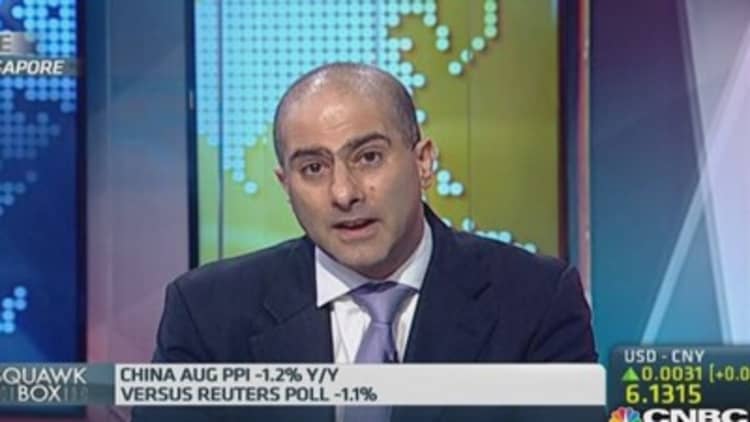
China's consumer inflation eased in August while wholesale deflation intensified, clouding the outlook for an economy struggling to stage a convincing recovery.
China's consumer prices eased to 2 percent last month, data on Thursday showed, slower than July's 2.3 percent rise and below a Reuters poll expecting a 2.2 percent increase. This remains below Beijing's official target of 3.5 percent.
Producer prices, meanwhile, continued their deflationary spiral, dipping 1.2 percent after falling 0.9 percent in July, a tad worse than the 1.1 percent fall expected. Producer prices in China have been declining since February 2012, weighed by falling commodity prices, overcapacity and weakening demand.
"I think the figures are consistent with a whole lot of data showing that the Chinese economy losing momentum again," said Rob Subbaraman, chief economist at Nomura.
Read MoreChina'sreforms reducing hard landing risk: Premier Li
"The PPI deflation is worsening, I think that's a sign of overcapacity problems. The oversupply problem in the property sector is starting to have effects on the upstream industries that supply the property sector. They're feeling the pinch now so that's showing in the PPI," he added.
China's economy growth slowed to 7.4 percent in the first quarter from a year earlier, the slowest pace in six quarters. Growth inched higher to 7.5 percent the second quarter, but a flurry of recent data has painted a bleak picture in credit inflows, manufacturing and the real estate market.
Chinese policymakers have been supporting the economy with carefully calibrated targeted easing in recent months, but there has been debate over whether they should take on more aggressive measures.
"So far there hasn't been any major rate cuts [but if] the data continues to weaken and growth looks like it's going to undershoot 7.5 percent by 0.1 or 0.2 percent, we will see more aggressive easing," said Subbaraman.
Still, if the speech by Premier Li Keqiang on Wednesday is anything to go by, most analysts expect Beijing to refrain from monetary easing in the near term.
Read MoreChina real estate: A bubble bursting
"Premier Li emphasized this week that money supply is already at a high level, and China can no longer rely on monetary expansion to stimulate the economy," analysts at Citi said in a note. "We expect the authorities to keep the easing policy bias to achieve the growth target, mainly by targeted policies to lower the cost of funding."
Market watchers broadly expect the government will meet its 7.5 percent growth target for this year, but the outlook for 2015 remains uncertain.
"The government and its team had to work very hard to put together a mini package of stimulus. I think now the economy is actually coming back so this year, around 7.5 percent should be no problem. The issue is next year – what will it be next year?" said Li Daokui, professor at Tsinghua University and former advisor of PBOC.
Read MoreWhy the 'Made in China' model is weakening
"It's likely for the government to slightly turn down its target for next year's GDP (gross domes tic product) growth. Maybe anything between 7 to 7.5 percent," he added.

